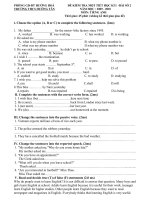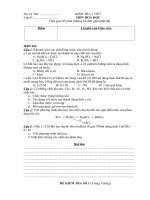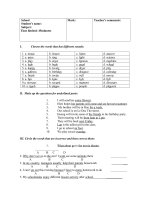Đề kiểm tra anh văn 1 tiết – Số 5 pdf
Bạn đang xem bản rút gọn của tài liệu. Xem và tải ngay bản đầy đủ của tài liệu tại đây (85.88 KB, 3 trang )
Đề kiểm tra anh văn 1 tiết – Số 5
I/ Arrange these words into the right categories according to their stress pattern
Education, university, certificate, requirement, opportunity, agriculture, thoroughly, linguistics, existence, agency,
institution, severely, performance, identify, engineering, applicant, preference, indicated, architecture, economics,
considerably, candidate, international, security, creativity, insurance, average, Mathematics, majority, available,
1
st
syllable
2
nd
syllable
3
rd
syllable
II. Pick out the word which has the underlined part pronounced differently from the rest.
1. A. academic B. campus C. apply D. entrance 2. A. receive B. achieve C. increase D. creative
3. A. tutor B. subject C. study D. result 3. A. scary B. challenge C. psychology D. course
5. A. require B. society C. twice D. applicant 6. A. blame B. amaze C. scary D. inflation
7. A. achieved B. advanced C. required D. replied 8. A. reason B. misery C. misbehave D. propos e
III. Choose the correct words
1. Have you considered (asking/ applying/ getting) for a job.
2. The United Nations (consists of/ contains/ includes) 150 member countries.
3. Your glass is (vacant/ empty/ lack). Help yourself with more beer.
4. If you had the (selection/ permission/ choice), would you leave school early and get a job?
5. If you don’t mind walking the stairs, there are still some (vacant/ empty/ spare) rooms on the fourth floor.
6. The (medium/ average/ usual) temperature in Hue in summer months is 35
o
C.
7. She (replied/ answered/ Either A or B) to my wave with a nod.
8. (General/ Secondary/ Tertiary) education refers to education at college or University level.
IV. Complete each sentences by choosing the correct option.
1. If you don’t want to come, we can’t be sure/ we’ll understand/ you would stay at home
2. If you’d told him your plan, he had given you some advice/ he could help you/ he’d have stopped you.
3. If he had the choice, he would have changed his job/ he would stay/ he wouldn’t be so happy.
4. If you won a lot money, what do you do? /would you lend me some? / you’d better travel around.
5. If you don’t hurry, you‘ll miss the bus/you would be late/ you are late for work.
6. If I weren’t so tired, I would have gone out with you/ I’ll give you a hand/ I would join you there.
7. If your throat hurts, try salt water/ you’d go to see the doctor/ I asked someone else.
8. If I hadn’t known the answer, I would have to study again/ I might fail the test/ I would have asked for help.
V. Use the correct form of the verbs in brackets.
1. If we (not/ catch) in the rain, we (go) to the performance on time.
2. If you (try) harder, you would have succeeded.
3. If Minh (be) here now, he (know) how to solve the problem.
4. If you (heat) the water, it (boil).
5. If he (not/ have to)work all the time, he (join) us in those activities.
6. She (hear) the news if she (turn) on the radio this afternoon.
7. If we (not/ have to) work tonight, we (attend) the party.
VI. Match the beginnings of sentences in A with their ending in B
A B
1. If Sally opens that door,
2. If mike had listened to his father,
3. I would quite like Juno,
4. If Dave didn’t work so much,
5. We would have arrived early,
6. If I was as lovely as Nancy,
7. If teenagers want to have a party,
8. The house wouldn’t have been such a mess,
9. Take one look at Alan,
10. If you were as handsome as a film star,
a. if she wasn’t such a jealous type.
b. I’d probably have lots of boyfriends.
c. they usually wait until their parents go
out.
d. and you’ll never forget his face.
e. he wouldn’t have got into trouble.
f. I still wouldn’t love you!
g. she’ll get a nasty surprise.
h. if the roads had been less busy.
i. he wouldn’t get so tired.
j. if the guests hadn’t been careless
VII. Complete the sentences with the correct form of the verbs in the box:
admit
accept
create
apply
decide
1. The must file a written to the university.
2. Many students apply for to more than college.
3. Students at university are called while they are studying for their first degree.
4. She went to college to continue her
5. When is the final date for the of theses?
educate
require
graduate
submit
achieve
6. This exercise encourages in the use of language.
7. What is the minimum entrance for this course?
8. Such behavior is totally in a civilized society.
9. Success should not be measured only by international
10. It is the chief executive’s opinion which is ultimately
VIII. Complete the conversation. Put in the correct form of the verb in brackets.
Lucy: I’m going to watch a documentary on fashion tonight if no one (want) anything else.
Emily: What’s time is that?
Lucy: Half past eight.
Alice: If it goes on after nine o’clock, (we/ miss) the start of the film.
Emily: I’d like to see the film too.
Lucky: Well, If you’re both watching the film, (I/ watch) it with you . If (I/
record)
the documentary, I can watch it tomorrow.
Alice: I don’t think we‘ve got another tape. You know if we bought a few new ones, (we/ not keep)
having this problem.
Emily: If (I / think), I could have bought some at the supermarket this afternoon.
Lucy: Chloe has recorded some tennis on this one, but that doesn’t matter. If she really wanted to,
(she/watch) it by now.
Emily: Chloe (be) annoyed if you record over her tennis.
Alice: I’d be annoyed if someone (do) that to me.
Lucy: I’m sure if I explain, she (not/mind).
Emily: Well, if (there/be) a row, I’m going to keep out of it.
IX. Complete each sentence with the correct form of the word given in CAPITAL
1. His to retire early surprised everyone DECIDE
2. When Honda advertised for a new marketing manager, they received over thirty for the job APPLY
3. most people spending money to earning it PREFERENCE
4. When she had a baby, she had to between giving up her job and hiring a nanny. CHOICE
5. My sister is very about which shoes to wear with which dress. CHOICE
6. to British universities depends on examination results ADMIT
7. Many people in the area want to their houses against fire but it is too expensive INSURANCE
8. The company still has for salespeople. Do you want to apply? VACANT
X. Read the passage and choose the best answer.
Further education in Britain means education after GCSE exams (1) around the age of 16. It
includes courses of study (2) to “A” level which students take at their school or college. Some students go
(3) to a college of further education which (4) a wide range of full and part-time courses. Further
education also includes training for professional (5) in nursing, accountancy and management and in
(6) such as art and music. The term (7) education is used to refer to degree courses at university
The British government is keen to (8) more young people to remain in education as (9)
as possible in order to build up a more highly (10) , better educated workforce.
1. A. taken B. made C. performed C. participated 2. A. led B. linked C. leading D. linking
3. A. ahead B. right C. straight C. forward 4. A. gives B. offers C. supports D. presents
5. A. degree B. diploma C. certificate D. qualifications 6. A. skills B. fields C. topics D. respects
7. A. higher B. tertiary C. further D. all are correct 8. A. ask B. make C. remind D. inquire
9. A. soon B. long C. well D. much 10. A. skilled B. valued C. devoted D. talented
XI. Read the passage and choose the best answer.
In Britain, the availability of higher education has increased greatly in the second half of the twentieth
century. Nevertheless, finding a place in a university in Britain is not easy. University only takes the better students.
Because of this, and also because of the relatively high degree of personal supervision of students, nearly all
university students are not supposed to take a job during term time. Unless their parents are rich, students receive a
state grant of money that can cover most of their living expenses.
The Open University in Britain, which was started in 1969, allows people who don’t have the opportunity to
go to a university to study for a degree. Its courses are taught through television, radio and especially written course
books. Students work with their tutors, who discuss their written work, either at the meetings or through
correspondence. In the summer, they have to attend short residential courses of about a week.
1. Students don’t find it easy to be offered a place in a university in Britain because of
A. the availability of higher education B. an entrance requirement for good students
C. a lack of schools for higher education D. a high degree of personal of supervision of students.
2. Most British university students can’t take a job during term time because
A. their parents are rich B. they get a grant of money from the state.
C. they are good students D. they are closely supervised by the university.
3. Open University students in Britain are required … A. to attend courses once a week.
B. to study at home through television, radio or with tutors at meetings or through correspondence
C. to study at home during the course. D. to attend short courses during the summer
4. What does the underlined phrase residential course mean?
A. it’s a compulsory course B. It’s an optional course
B. it’s a course for local students D. It’s a course that students are required to live in the university.
5. What is not true about the passage?
A. University in Britain is open to all students B. Students can’t work part-time while taking their course
at university
C. The state grants money to poor university students D. Tutors in the Open University help students with
their written work









